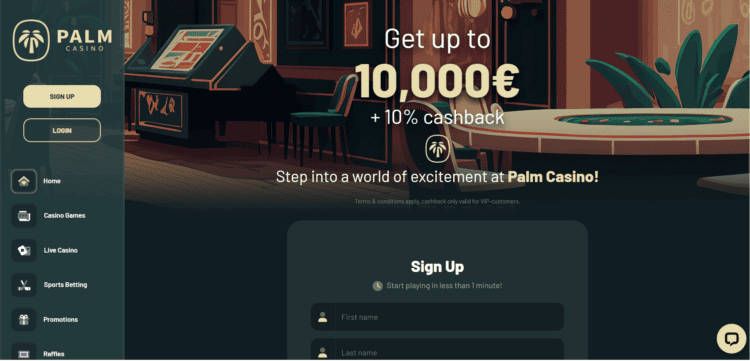
New online casinos have many advantages over established gambling sites – they offer more attractive bonuses, the latest casino games, and professional customer service available 24/7. In addition, they allow you to try something new, something you haven’t experienced before. So it is no wonder they are so popular among UK players.
In this guide, we will show you the best new UK casinos 2024, the pros & cons, the latest online casino trends, payment methods, and much more. So, keep on reading to learn more!
The Best New UK Casinos 2024
Our team tested over 50 online casinos that have recently launched and are available in the UK market. We made over 50 real-money deposits and tested each new UK casino. We looked at customer support, games, bonuses, wagering requirements, payout times and everything else you can think of. And that’s how we came up with a list of the best new UK casinos, which you can see below. Also keep in mind that when a casino comes to market, it must first go through our testing process. Depending on how it performs, it may or may not be added to the list.
- Fantastic welcome bonus
- Fast payouts
- Bitcoin & credit cards & other payment methods
300% GBP Welcome Bonus + 150 FS
Play now!- 10X wagering NO max payout
- Total welcome package: 450% up to £7500
- Fast withdrawal times
1st Deposit Bonus - 200% up to £250
Play now!- Great WAGER FREE Welcome Bonus
- Fast Payouts
- Fantastic Customer Support
£500 + 250 FS WAGER FREE
Play now!- Huge welcome package
- Fast withdrawal times
- Decent selection of games
1st Welcome Bonus: 300% up to £500
Play now!- Free spins shop available
- Bitcoin accepted
- Up to 30% cashback
900% up to 9000 GBP + 150 Free Spins
Play now!- Total Bonus: 400% up to £2500
- Fast Withdrawal Times
- Only 5x Wagering
200% Up To £500 1st Deposit
Play now!- Massive welcome bonus
- Fast payouts
- Lots of payment methods
Welcome Bonus 450% UP TO £6000 + 325 FS
Play now!Affiliate Disclosure: Our website features affiliate links to various online casinos. When you click on these links and make a deposit or sign up, we may receive a commission or compensation from the casino. This helps support our efforts to provide you with valuable information and the latest casino promotions. Please gamble responsibly and ensure you are of legal age to participate in online gambling activities.
Palm Casino: Brand New Casino With Cashback

Gxmble: Modern Online Casino With Fresh Design

Goldenbet: Brand New Online Casino With Hot Promotions

myStake: New UK Casino With Fast Payouts

Freshbet: New Casino With Crypto

Seven.Casino: Brand New Online Casino

Rolletto: Brand New Casino With Lots of Crypto

Highbet: New Casino With Sportsbook

Metal Casino: New Online Casino in the UK

Winstler: New Casino Perfect For High Rollers

What is a New Casino?
Here at GameRules.com, we see it as our mission to help you find new casino sites and make the whole experience relaxed and hassle-free. Therefore, we would like to give you a detailed review of all new releases so you don’t miss a thing. Experienced players and beginners will find everything they need to know here, from the best new mobile sites to new free spins.
Are there not enough online casinos now? We think not! And not only do we believe so, but casino operators also surprise us again and again with new platforms bursting with new technologies and innovative features, like Pay n Play or no account casinos. Gone are the days we had to dress up to choose between a few slot machines and some table games in a classic casino.
But what exactly is a new casino? We consider a new casino to be one that was founded in 2023 and 2024. The number of new online casinos is growing and growing, and with it, the player base. That’s why there will be many new online casinos in 2024, which we are already looking forward to.
How to Find The Best New Online Casino in 2024?
Given the current climate, it’s no surprise that people are looking for new ways to entertain themselves. One popular option is online gambling, which has seen a surge in popularity over the past year. If you’re thinking of trying your luck at an online casino, you may be wondering how to find the best one.
Fortunately, you can find all the information you need on our website. We’ve compiled a list of the top new 2024 casinos in the UK so you can compare features and find the perfect one for you. We also provide helpful reviews and ratings to give you an idea of what other British players think of each casino. So, check out our website if you’re looking for a new place to gamble or just want to learn more about new 2024 online casinos.
How to Play At a New Casino Site 2024 in the UK?
Playing at new casinos is no different from playing at older and well-known gambling sites. Online casinos provide access to games after fulfilling the following steps:
Time needed: 5 minutes
- Registration
You need to register at your chosen online casino first. We recommend checking our list to find the best new UK casinos.
- Deposit
Top up your casino account with a payment method of your choice.
- Bonus
The next step is to activate all bonuses and promotions at the site.
- Play
Now you can play all your favourite games and win!
Top New Online Casinos 2024 in the UK by Category
| 🏆Best New Casino | Winstler Casino |
| ⚡️New Casino This Month | Seven.Casino |
| ☎️Best New Mobile Casino | myStake Casino |
| 🎰Best New Live Casino | Highbet Casino |
| 🎁Best New Bonus Offer | Roletto Casino |
| ₿ Newest Crypto Casino | Goldenbet Casino |
What Do New UK Casinos 2024 Offer?
New casinos are all about brand-new experiences! And new experiences are something that casino players are actively looking for. We all want to maximize our time and have as much fun as possible. So checking out new, unfamiliar platforms will raise your adrenaline levels and make the game much more enjoyable.
However, the list of advantages of new UK 2024 casinos is not limited to the subjective feelings of players. New casinos are also an excellent choice in terms of money, as most offer solid welcome bonuses to attract new players. As soon as a casino becomes established in the market, the welcome bonus is usually reduced. There are often a lot of new offers that are not profitable for players anyway, but they are usually more enjoyable, such as new cashback bonuses, spins on selected slots, etc.
New casinos often enter the market with new ideas. After all, it’s new ideas that attract new users, right? So if you are looking for new, never-before-seen games, chances are the new online casino will have them. This means niche slots, new versions of poker and blackjack from smaller software providers, and often even in-house casino productions. Many of the new 2024 casinos in the UK that focus exclusively on one or a few games are also fully responsible for creating their own software.
Advantages & Disadvantages of New UK Casinos 2024
Advantages
Disadvantages
What to Look For When Choosing a New Casino 2024?
License
All new online casinos must go through a licensing process to offer gambling services in the UK. Only after a new casino has confirmed its honesty and reliability can it accept bets from players. The most popular and desirable licenses are those from reputable gaming jurisdictions such as the UK Gambling Commission and the Malta Gaming Authority.
Payment methods
If you want to play at a new online casino 2024 for real money, you need to make a deposit and have a convenient way to withdraw your winnings. Before creating a new account, check if the available payment methods are accepted in the UK and are suitable for you.
Bonuses
Playing at new casino sites comes with many benefits that regular online casino players can only dream about. One of them are bonuses and promotions offered to new and regular players of 2024 casinos. But, remember, you should always read about it in terms and conditions.
Customer support
As a new player, you may have questions about registration, bonus offers, or how to withdraw money. Problems can arise at any time of the day or night, so 24/7 customer service is essential.
Game selection
When checking out a new online casino, look at the number of games and their suppliers. Well-known companies such as Microgaming, Playtech or NetEnt act as a seal of approval for a new online casino, as they only supply their games to fair and licensed gaming sites.
Design
One of the first things you see when you open the site is the design of the site, which is intended to be as simple and user-friendly as possible for the inexperienced user.
Play responsibly
It is a special section of the website where all the rights and responsibilities of the casino and the customer are clearly defined. In addition, the best new 2024 casinos feel responsible for their players, so they offer them responsible gambling. Check to see if you can set your own limits on deposits, losses or time spent playing.
User reviews
New online casinos are often created by companies that already own other gambling sites. It is therefore worth reading some reviews of the operators themselves. Also remember to carefully read reviews of a particular company written by experts and other players.
Latest Online Casinos UK – April 2024
April means lots of new bonuses and promotions at online casinos. For example, new online casinos may offer special bonuses in April to celebrate Easter Monday! So if you are looking for a new casino in April 2024 that offers lots of bonuses and April promotions, you can be sure to find it on this page. We update our list regularly to give you the best value for your money. Just take a look at the table above and get in on the action now.
Online Casinos 2024 – New Trends
Last year brought an absolute explosion in the online casino market. It looks like this trend will continue this year. We will definitely see massive growth: by 2026, the entire online gambling market is expected to be worth more than $100 billion. It is worth knowing that the entire online gambling industry in the UK was worth £16.7 billion in 2023. That is huge. Moreover, 95% of all UK players who play in online casinos choose to play at home. So it is a myth that online gambling takes place in the park or at the bus stop.
What other changes await us in the online gambling market?
New technologies
As for now, we can forget about virtual reality in online casinos, as it is only in the experimental stage. However, live casinos with a live dealer are a standard now. Therefore, the best operators offer games from leading providers as well as smaller operators experimenting with 4K resolution and other modern technologies.
More interactive
Traditional casino games today are increasingly facing competition with interactive quizzes and games that we have known until now:
- online quiz shows,
- TV quizzes,
- instant win games,
- board games adapted for online casino play (such as Monopoly).
Mobile technology
New 2024 casinos offer the best mobile games. They utilize touchscreen capabilities to the fullest and let you entertain yourself anywhere. In addition, more and more casinos are also building their apps for account management, deposit, withdrawal of winnings, and full support of all games.
3D technology
Modern real-money slots are nothing like the games created in the 1990s, which simply copied the mechanics of the first slot machines from the 19th century. Take, for example, the following games that have debuted in recent months. Not too different from regular computer games, these latest 3D slot machines offer top-notch graphics that add to the fun and excitement of playing.
- Mount Magmas
- LolliPop
- Slugger Time
E-sports and action games
Casino operators are expanding their portfolio with sports betting. The same happens with bookmakers, who increasingly add classic casino games to their offers. E-sports have emerged at the crossroads of these 2 areas and are becoming increasingly popular among both players and those interested in betting.
E-sports are particularly attractive to the younger generation, the so-called millennials. Born at the turn of the 20th century, more than 50% of those surveyed prefer to participate in e-sports rather than traditional sports. So it’s no wonder that casino operators and bookmakers are looking to capitalize on this opportunity to attract more customers.
AI is making its way into UK new 2024 casinos
Among the trends that will dominate new UK casinos in 2024 is the expansion of artificial intelligence. Until now, casino operators have used it in the customer service department. Today, the process of fraud detection in casinos is fully automated. It is primarily the responsibility of AI modules to ensure player integrity and security.
Who Created, Edited & Fact Checked The Content Here?
The content you see here is created and reviewed by a number of experts in the online gambling industry. Below you can find out more about them, what they look for in new online casinos and which are their favourite sites. Let’s see:

Robert Miller
Editor-in-chief, 15 years of experience in the online gambling industry and has fact checked all the information you see on this page
“For me, the most important is to be able to deposit and withdraw with Paypal, as well as fast withdrawals. My favourite new casino? Winstler. They have everything you need.”

Jake Barry
Online gambling editor, responsible for research and fact checking. 12 years in the online gambling industry, retired poker pro
“I like it when an online casino has a mobile app and lots of slots because that’s what I enjoy the most. I recommend Goldenbet! They have hundreds of slots and fast withdrawal times!”

Jordan Adams
Online gambling editor & slots expert, 10 years in the online gambling industry
“What matters most to me are high bonuses and low wagering requirements. I also like when a casino has a lot of payment methods to choose from. I recommend you myStake Casino where you can get 30% cashback on sports, slots & mini games.”
New Online Casinos vs. Established Gambling Sites
On the surface, established online casinos might seem like a better choice, but is that really the case? Check out our table below to find out more:
New Online Casinos:
Established Online Casinos:
Payment Methods at New 2024 UK Casinos
New online casinos established in 2024 offer the best payment methods out there. You can find old good e-wallets like Skrill or Neteller and new, innovative mobile payment methods like Siru Mobile or Boku. At most new online casinos in the UK, you will be able to pay with the following payment methods:
- E-wallets: Neteller, Skrill, Ecopayz, Mifinity
- Prepaid cards: Paysafecard, Neosurf
- Mobile Pay: Google Pay, Apple Pay, Boku, Siru Mobile, Amazon Pay
- Cryptocurrencies: Bitcoin, Litecoin, Ethereum etc.
- Fast bank transfer: Trustly, Zimpler, Klarna
- Bank transfer
Keep in mind that you can’t use credit cards for gambling in the UK since 2020.
Newest UK Casinos & Their Payment Methods
Below we have listed the most popular payment methods in the UK. Which are the newest casinos to offer them? Let’s see:
| Skrill | Neteller | Visa/Mastercard | Apple Pay | Google Pay | Boku | Trustly | Ecopayz | Paypal | Bitcoin | Paysafecard | Neosurf | |
|---|---|---|---|---|---|---|---|---|---|---|---|---|
| Goldenbet | ✔️ | ✔️ | ✔️ | ❌ | ❌ | ❌ | ❌ | ❌ | ❌ | ✔️ | ✔️ | ❌ |
| Winstler | ✔️ | ✔️ | ✔️ | ❌ | ❌ | ❌ | ❌ | ❌ | ❌ | ✔️ | ✔️ | ❌ |
| MyStake | ✔️ | ✔️ | ✔️ | ❌ | ❌ | ❌ | ❌ | ❌ | ❌ | ✔️ | ✔️ | ❌ |
| Metal Casino | ✔️ | ✔️ | ✔️ | ❌ | ❌ | ❌ | ✔️ | ✔️ | ❌ | ✔️ | ✔️ | ❌ |
| Gxmble | ✔️ | ✔️ | ✔️ | ❌ | ❌ | ❌ | ✔️ | ❌ | ❌ | ✔️ | ✔️ | ❌ |
| Highbet | ✔️ | ✔️ | ✔️ | ❌ | ❌ | ❌ | ✔️ | ❌ | ✔️ | ❌ | ✔️ | ❌ |
| RichPrize | ❌ | ❌ | ✔️ | ❌ | ❌ | ❌ | ❌ | ❌ | ❌ | ✔️ | ❌ | ❌ |
| Seven Casino | ✔️ | ✔️ | ✔️ | ❌ | ❌ | ❌ | ✔️ | ❌ | ❌ | ✔️ | ✔️ | ❌ |
Casino Bonuses at New Casinos 2024
New casino bonuses play an important role in any new online casino. Not only do they help to attract more players to try out the casino, but they also help to retain players for longer periods of time. As a result, UK players are most likely to choose those new casinos that offer generous welcome offers, deposit bonuses and free spins without a deposit.
Why Take Advantage of Casino Bonuses at New UK Online Casinos 2024?
With casino promotions, you can test what the operators offer without risking your own money. Depending on the offer, you can play free or have your gambling sessions extended at no extra charge. Most importantly, you can play and win real money by taking advantage of casino bonuses.
Welcome offers
A welcome bonus, also known as a sign-up bonus, registration bonus, or new player offer, is usually the biggest promotion you can get at a new casino. It is a reward for any new player who registers at a casino for the first time and makes their first deposit.
Welcome bonuses vary depending on which gambling site you choose. For example, you can receive a certain amount of money and free spins without a deposit just for creating an account, doubling your first deposit, or a massive sign-up bonus covering your first five deposits. Read the terms and conditions carefully and learn the bonus wagering requirements before accepting any welcome offer.
No deposit bonus
UK players love no deposit bonuses 2024 that are often found at new online casinos. Why? Because new operators know that this is the most effective way to encourage new users to try them out. No deposit bonus 2024 is so popular because casinos award extras in the form of funds to play or free spins without expecting anything in return.
All you have to do is open an account at a new casino and you can start playing almost immediately. Unfortunately, the amount of the no deposit bonus is never as high as the first deposit bonus. This is because casinos want to avoid a situation where a player uses the free money, withdraws his winnings and never returns to the casino. Nevertheless, the value of the no deposit bonus allows you to test the main features of the casino and form an opinion about it.
Free spins
Free spins are the kind of promotions you can often find in new casinos. Free spins are usually awarded in the following situations:
- Upon registration
- After making a deposit
- Along with a deposit bonus
- During regular weekly promotions
- As gifts for VIP players
- As tournament prizes prizes in tournaments.
You can use free spins at these new 2024 casinos on any slot machines or those selected by the casino. It allows players to spend time on the slots they like and discover games they may never have heard of. In addition, winnings from no deposit free spins often come with additional wagering terms, so remember to check them out.
New Online Casino 2024 UK: Safety & Licensing
New online casinos are causing reasonable concerns about reliability and security. It’s a good idea to follow the principle of limited trust on the Internet, especially if you’re depositing your money somewhere.
Most new UK casinos 2024 are safe, so you shouldn’t expect any problems from them. Unfortunately, some will be geared solely toward scams. So, it is worth sticking to the new online casinos 2024 we recommend on our site. We verify in great detail all the casinos listed on our site.
If you search for it by yourself, check the license number and by which authority it was issued. The casino’s credibility is also significantly increased by cooperation with well-known software developers, such as NetEnt or PlayN’Go. These gambling regulators license most of the new online casinos on our website:
- UK Gambling Commission (the most reputable one)
- Malta Gaming Authority
- Curacao
So, if you see that UKGC licenses a new casino, you can be sure that is reliable and trustworthy.
FAQs New Online Casinos UK 2024
A new casino is an online casino that was established in 2023 or 2024.
To choose a reliable new casino, it is worth looking at relevant rankings such as ours. It is also recommended that you read the opinions of players on various forums.
Sending documents is required to verify identity. We can play in some casinos without verifying our identity, but withdrawing winnings will not be possible in this case.
At the new 2024 online casinos, we strongly recommend looking into the live dealer games section. The newest casinos have an expanded offer of roulette, blackjack, and other popular table games. In the live mode, you can feel excitement similar to that felt in real casinos.
As the online casino industry has become one of the most lucrative industries in the world, many companies have decided to set up their own sites. As a result, it is estimated that 200 new casino sites are launched every year.
No, you can’t use credit cards for online gambling in the UK.

Robert Miller
Editor-in-chief
38-year-old from London. He has a wife and a beautiful daughter. Robert has almost 15 years of experience writing quality casino content. He enjoys baccarat, board games, and Arsenal London.

















